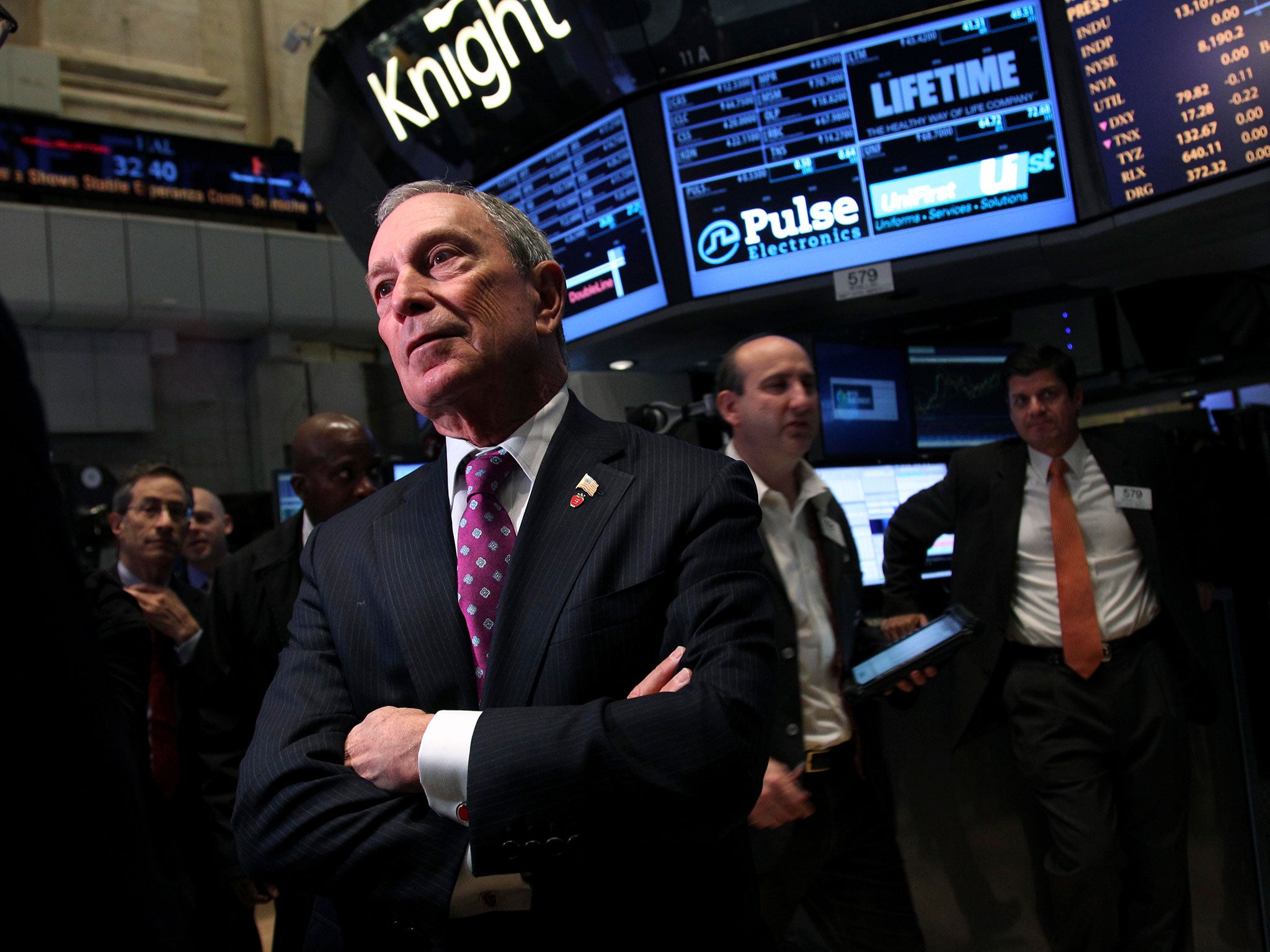Michael Bloomberg could enter US presidential race as an independent - but does he mean business?
The former Mayor of New York’s entry into this most unpredictable of White House campaigns has again shocked the nation. Tim Walker asks whether the billionaire is a genuine threat or superior spoiler

With just one week to go before voters in Iowa decide the first contest of this year’s by turns exhilarating and exasperating US presidential election, another wild-card billionaire is weighing whether to step in or stay home.
Michael Bloomberg, the former mayor of New York, could disrupt the campaign momentum of rivals on both sides. Yet some Republicans and Democrats have rushed to welcome the 73-year-old to the race. “I’d love to compete against Michael,” Donald Trump, the Manhattan real-estate magnate and Republican frontrunner, told CBS’s Face the Nation, adding: “I think he might very well get in the race and I would love to have him.”
John Kasich, Governor of Ohio and a more mainstream GOP hopeful who has surged to second place in the New Hampshire polls, told reporters Mr Bloomberg would “stimulate the debate” should he run. “I’m all in favour of that,” Mr Kasich said. “Maybe we could have a more serious debate instead of, you know, some of the things we see.”
Thanks to the financial and media empire that bears his name, Mr Bloomberg is worth an estimated $36.5bn (£25.6bn), a personal fortune more than eight times the size of Mr Trump’s. Originally a Democrat, he was twice elected mayor of New York on the Republican ticket, but declared himself an independent before serving his third and final term. Since leaving office in 2013, he has spent millions of his own money on progressive causes, in particular backing political candidates who favour gun control.
Discomfited by the direction of the presidential primaries, Mr Bloomberg has had plans drawn up for a potential tilt at the White House, The New York Times reported at the weekend. If Mr Trump or his closest rival, Ted Cruz, takes the Republican nomination from the right, and Vermont Senator Bernie Sanders scrapes past his Democrat rival Hillary Clinton on the left, Mr Bloomberg believes there may be room for a run up the political centre. He is said to be willing to spend $1bn on a campaign.
Mr Sanders said that he believed a Bloomberg candidacy would clear his way to the White House. Speaking to Face the Nation, the socialist Senator said that in a three-way contest between himself, Mr Trump and Mr Bloomberg, the two billionaires would fight each other to a standstill. So far, so theoretical.
Ms Clinton, meanwhile, told NBC’s Meet the Press she intended to “relieve” Mr Bloomberg of the obligation to run by winning the Democratic nomination herself.
Mr Bloomberg also came close to running in 2008, the last time a dominant Ms Clinton was faltering in the primaries. The two are thought to have a mutual respect, if not a close personal friendship; Mr Bloomberg was New York’s mayor when Ms Clinton was a New York senator. In 2012, Mr Bloomberg reportedly attempted to recruit Ms Clinton to run as his successor.
Primary season kicks off with the Iowa caucuses on 1 February. Mr Bloomberg is expected to make a decision on whether he will run no later than March, by which time the Republican and Democrat races may at last have begun to take recognisable shape. The most successful independent candidate of recent times was businessman Ross Perot, who had 19 per cent of the popular vote in 1992. However, he received approximately that proportion of the vote in each state, and thus won none of the electoral college votes.
Donald Trump's most controversial quotes
Show all 14In December, Mr Bloomberg reportedly commissioned a poll to see how he would fare in a match-up with Ms Clinton or Mr Trump. It remains unclear whether, as a centrist candidate, he would attract more votes from the left or the right. With his close ties to the financial industry and his staunch support of socially liberal causes, he could put off voters from both sides of the partisan divide.
Mr Cruz recently attacked Mr Trump for having so-called “New York values”, a charge Mr Trump has strenuously denied. Mr Bloomberg, by contrast, wears his New York values with pride, and even Republican voters who despise The Donald might find it difficult to vote for the former mayor, whose views on gun control, abortion and immigration are so opposed to their own.
Former Florida Governor Jeb Bush, thought of as a Republican moderate, took care to put political distance between himself and Mr Bloomberg: “He’s much more liberal than I am,” Mr Bush said on ABC’s This Week, “but he’s a good person.”
According to the New York Times report, a Bloomberg campaign would position him as “a technocratic problem-solver and self-made businessman, who understands the economy and who built a bipartisan administration in New York”.
However, none of that appeared to interest Florida Senator and GOP presidential hopeful Marco Rubio, who told Fox News Sunday: “If [Mr Bloomberg] becomes a candidate, then we’ll have a conversation about our differences. If he’s just someone out there talking about running for president, well there’s a lot of people that have done that. As of now, he’s just a private citizen who owns a big company.”
Subscribe to Independent Premium to bookmark this article
Want to bookmark your favourite articles and stories to read or reference later? Start your Independent Premium subscription today.

Join our commenting forum
Join thought-provoking conversations, follow other Independent readers and see their replies